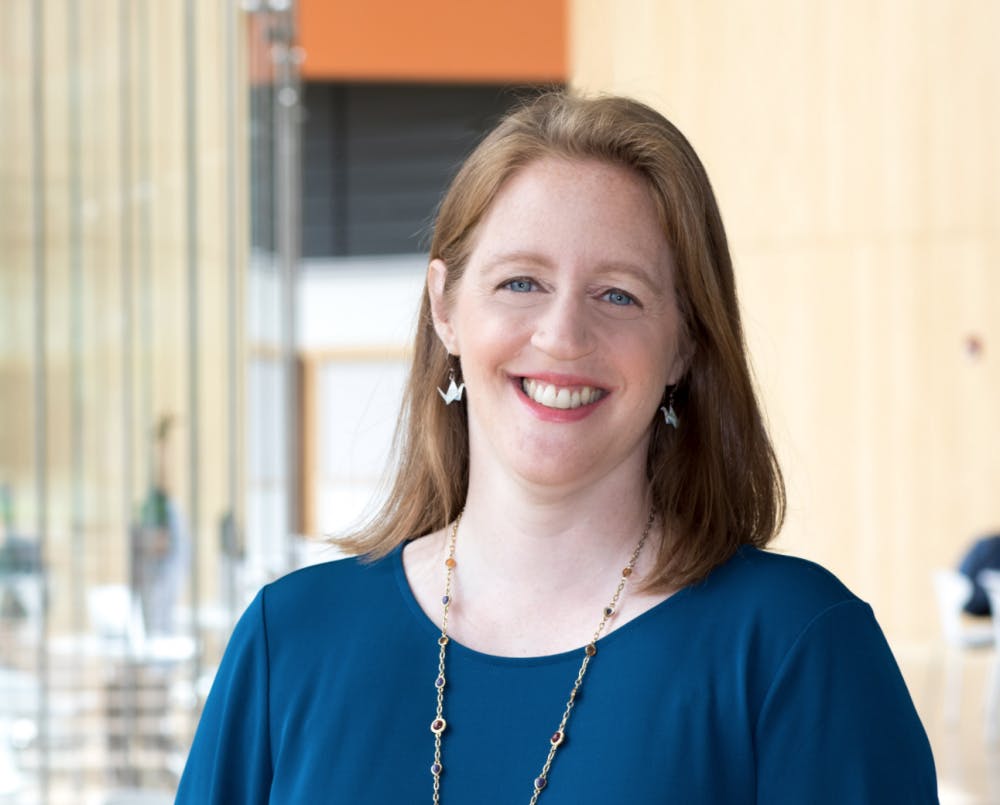Liz Fuller-Wright, a science writer for the University's Office of Communications, is always exploring new worlds and learning new things.
As an undergraduate at Amherst College, she majored in geology and minored in English. In her senior year, she took a class in planetary science, where she discovered the “huge questions” still left about conditions beyond Earth. She joined Brown University’s Planetary Geosciences program, where she investigated volcano-ice interactions on Mars for a few years before deciding that a Ph.D. wasn’t for her.
This put Fuller-Wright on a winding path to her current career. For two years, she taught eighth-grade science in Houston with Teach For America, a nonprofit that sends recent college graduates to teach in low-income schools. She struggled with maintaining a comfortable space for her students in a public school that was not the safest place.
“My two years in Houston taught me how to have a healthy classroom culture,” Fuller-Wright said. “But I didn’t know how to create a safe space outside my classroom door.”
She then moved to Washington, D.C., teaching seventh- and eighth-grade math and science at a charter school for a year. Fuller-Wright soon realized that teaching “was not a terrific fit.”
Fuller-Wright worked hard to improve her classroom management skills for three years, improving but never excelling. An article she read that suggested playing to your strengths rather than developing your weaknesses made her reevaluate her career. Fuller-Wright decided that rather than trying to force herself to improve at something she was weaker at — teaching — she wanted to focus on what she was good at — writing.
Teaching and science writing do have “significant overlap” in the ways that they require you to explain concepts to others, Fuller-Wright said.
“But in the places where they don’t overlap, I’m much more a science writer,” she added.
“I always loved writing. Words just poured out of me. And there wasn’t a role for that as a teacher. Those gifts were just lying fallow,” Fuller-Wright said.
More specifically, Fuller-Wright pinpoints her interest in science writing to her freshman year in college. Confused by a concept in her environmental chemistry course, she went door-to-door looking for someone who could help her. She was stunned by the number of people who said they couldn’t “do science.”
“At a profound level, that almost offended me. It upset me that people had written off all of the natural sciences,” Fuller-Wright said. “The phrase ‘I can’t do science.’ I want to eradicate that from the English language.”
She made it her goal to turn science into something more relatable.

After vacationing in the Middle East, Fuller-Wright fell in love with the region and applied to work there through the Peace Corps. For two years, she planned environmental curriculum materials for students in pre-kindergarten through twelfth grade in Morocco. She also kept a blog that caught the eye of the Christian Science Monitor’s Middle East editor, who liked the way she wrote about the region. When Fuller-Wright returned to the United States, she worked on and off with the newspaper for seven years, mostly reporting on science-related stories.
Finally, in 2017, Fuller-Wright moved to the Princeton area and began working at the University.
As a daily part of her job, she spends time sifting through research, looking for exciting topics to cover.
“There’s an endless abundance of science happening, everywhere, all the time,” Fuller-Wright said.
After identifying an interesting topic, Fuller-Wright works to learn enough about the subject to write about it clearly. She does everything from reading undergraduate textbooks and Wikipedia articles to combing through the articles with the researchers themselves. Her ultimate goal is to help scientists translate their work to a broader audience. Often, this involves using metaphors and phrases like “imagine this,” “what if,” and “picture this” to communicate the concepts.
Fuller-Wright’s favorite thing about her job is learning new things.
“I get to never stop learning. Every day, you learn something you didn’t know before,” she said.
Her most recent knowledge has come from the work of Sabine Petry, an assistant professor in the Department of Molecular Biology. Petry’s laboratory recently made a groundbreaking discovery about the assembly of microtubules, a fundamental structural component of cells. The lab hopes to grow new shapes and build these microtubules from scratch, Fuller-Wright explained.
Her advice to a budding science writer is to read the great science writers and learn from their style.
“There’s a grace to good science writing,” she said. “Good science writing has a gentleness and lightness to it.”
Fuller-Wright feels that the culture towards science has been hostile in recent times. Higher education and science are viewed with “condescension and contempt,” she said.
To that end, Fuller-Wright encourages future writers to enter the field.
“There’s never been a greater need for good science writing,” she said. “People who can make science inviting, entertaining, and welcoming are desperately needed right now.”








